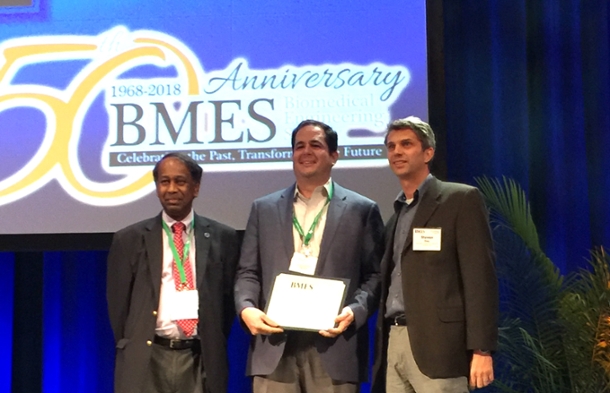
Keefe Manning, professor of biomedical engineering, (center) receives the Most Cited Article Award from Ajit Yoganathan, editor of the journal Cardiovascular Engineering and Technology, (left) and Steven Day, chair, biomedical engineering, Rochester Institute of Technology.
Biomedical engineering professor receives Most Cited Article Award at BMES
11/27/2018
UNIVERSITY PARK, Pa. — A biomedical engineering faculty member was one of a group of authors from various academic institutions and the U.S. Food and Drug Administration who received the 2018 Cardiovascular Engineering and Technology (CVET) journal's Most Cited Article Award at this year’s Biomedical Engineering Society (BMES) Annual Meeting.
Keefe Manning, professor of biomedical engineering, accepted the award at the annual meeting, held October 17-20 in Atlanta, for the article titled “Assessment of CFD Performance in Simulations of an Idealized Medical Device: Results of FDA's First Computational Interlaboratory Study.” The article was published in CVET in June 2012, and has been determined to be the most cited article to date in the publication since its inception in March 2010.
While the project the article was based on was spearheaded by the FDA, Manning’s lab, the Artificial Heart and Cardiovascular Fluid Dynamics Lab, was heavily involved along with researchers from four other universities.
The research, an FDA Critical Path Initiative project, provided experimental data for fundamental flows that are easily accessible to anyone for computational model validation. While computational fluid dynamics (CFDs) are commonly used for medical device development, it was unproven whether CFDs could be used for demonstrating device safety particularly predicting blood damage. To address this, Manning and other researchers completed an experimental interlaboratory study to determine both suitability and methodology for others to simulate fluid flow in an idealized medical device.
“The bottom line is that this FDA critical path initiative that my group has been a part of has provided some groundbreaking work for guidance for computational simulation validation for medical devices, particularly related to blood damage,” Manning said.
The end result of the project is a benchmark database that can help develop both better modeling techniques and consensus standards and guidelines for using CFD for evaluating cardiovascular medical devices.
“This work has and will continue to have impact in the development of cardiovascular medical devices,” Manning said. “Particularly with documents submitted to the FDA from industry demonstrating that their specific cardiovascular device technology is safe and effective if they use computational models to demonstrate as such.”
Along with Manning, other authors of the highly cited article include Steven Deutsch, senior scientist emeritus at Penn State and former head of the Artificial Heart and Cardiovascular Fluid Dynamics Lab; Michael Berman, Prasanna Hariharan, Matthew Myers, and Sandy F.C. Stewart of the FDA; Eric Paterson of Virginia Polytechnic Institute and State University; Greg Burgreen of Mississippi State University; Matthew Giarra of Johns Hopkins University; Steven Day of Rochester Institute of Technology, and Varun Reddy.



